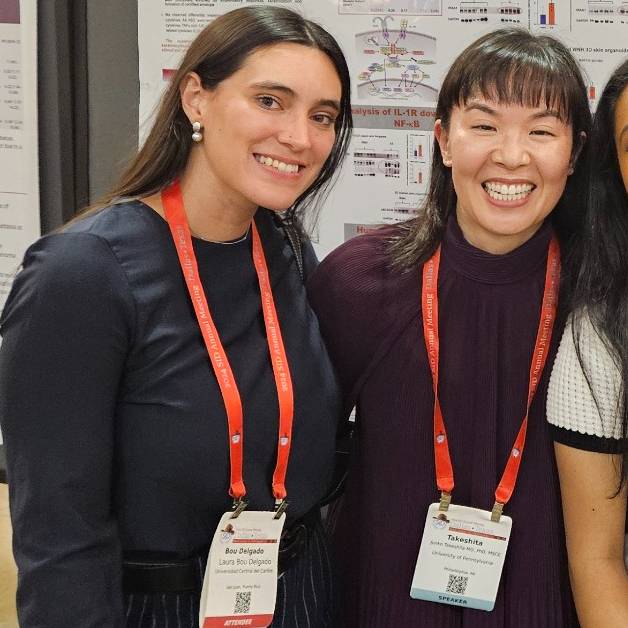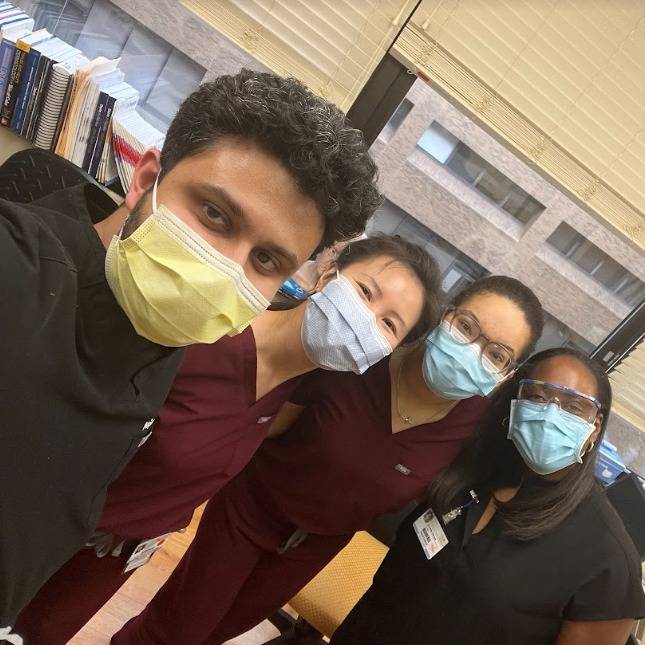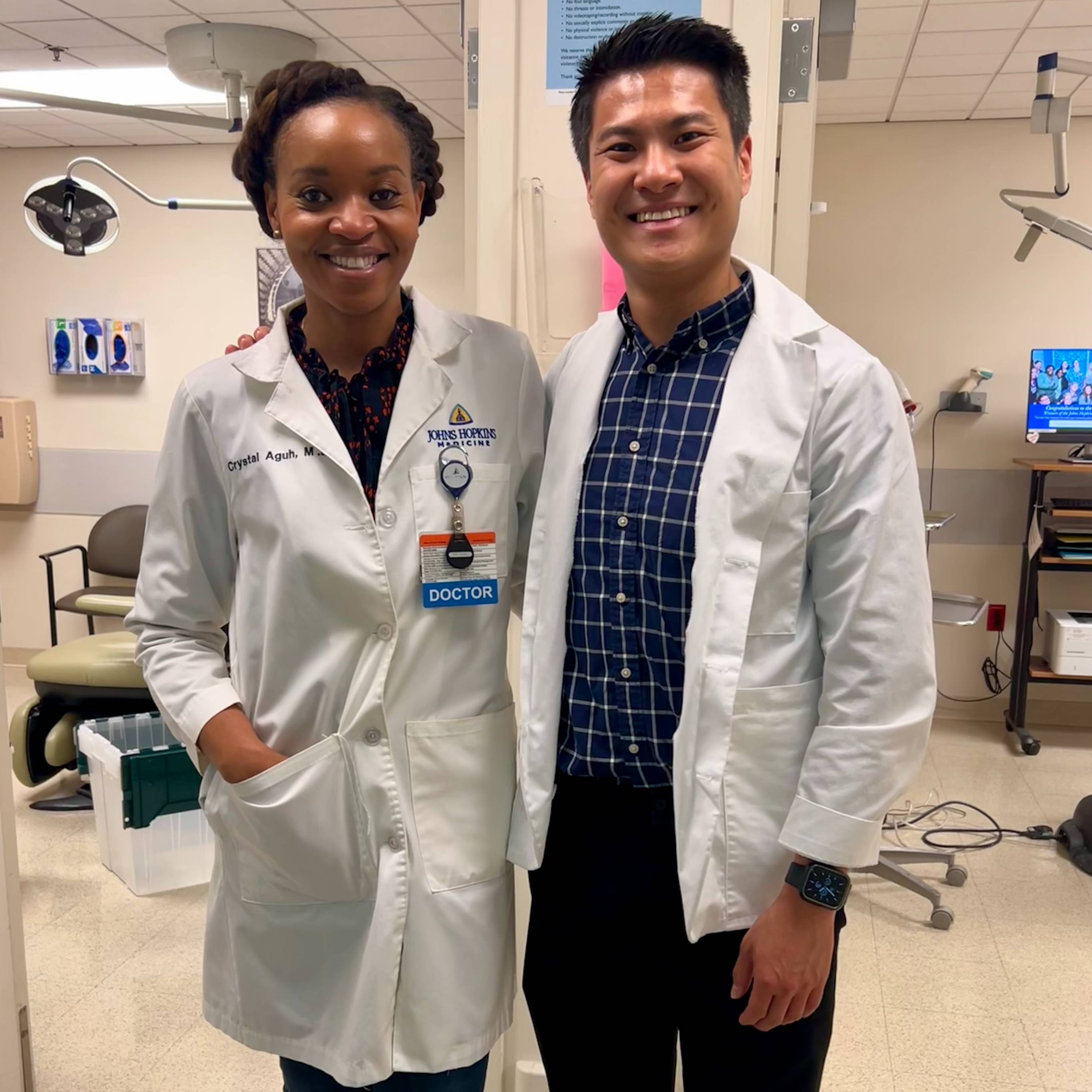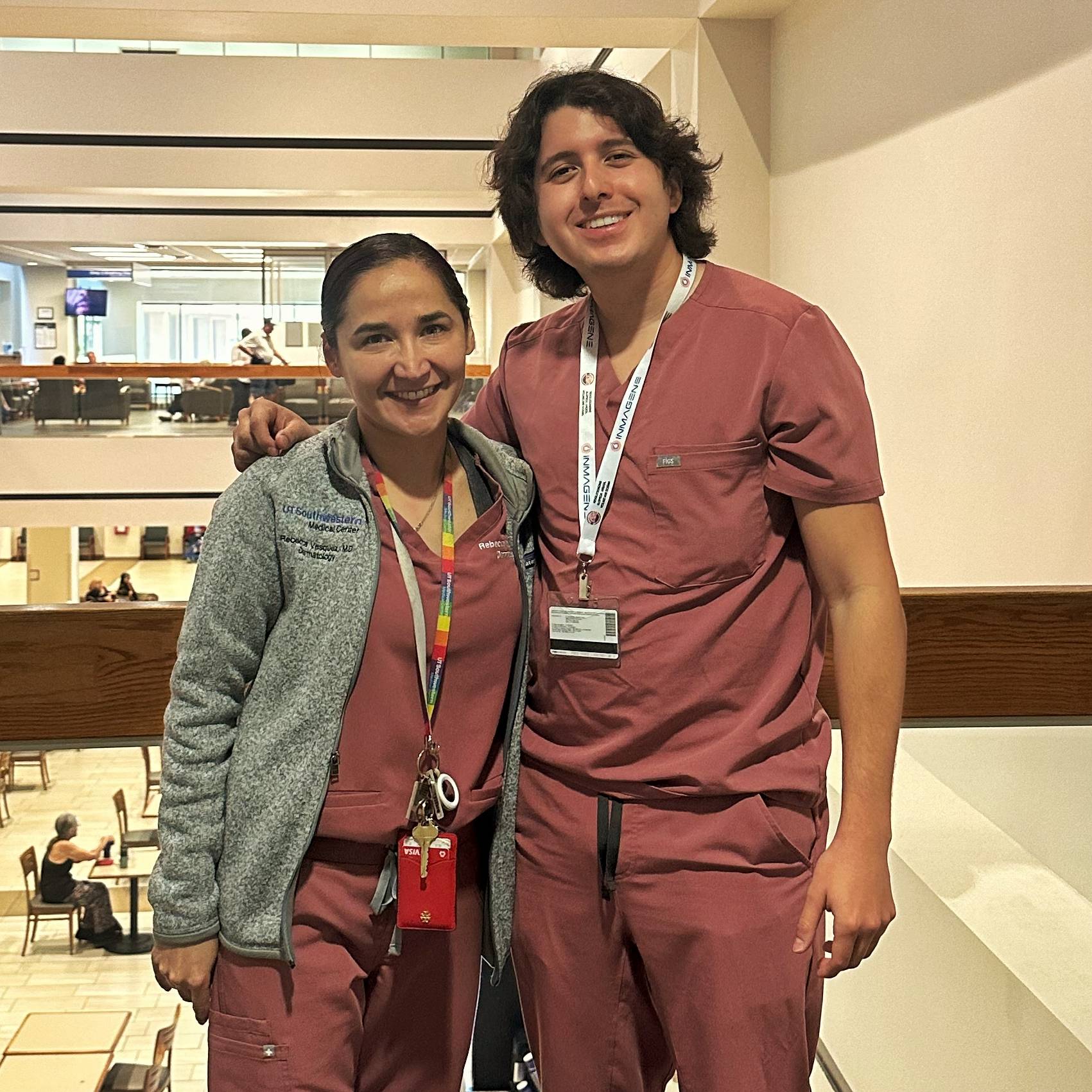
Mentee: Alicia Edwards, MS
Mentor: Adam Friedman, MD, FAAD
George Washington School of Medicine
I had the privilege of shadowing Dr. Adam Friedman at George Washington through the Skin of Color Society Grant and the experience has been both enlightening and transformative. This one-page summary encapsulates the invaluable insights and rich learning experiences gained during my time with Dr. Friedman and his dedicated team.
From day one, the entire team at George Washington Dermatology, including the staff, residents, nurses, rotators, and attending physicians, welcomed me with open arms. Their willingness to share their personal journeys into dermatology, answer my questions, and provide guidance created a conducive and supportive learning environment.
Dr. Friedman emerged as an outstanding mentor, characterized by his patience, directness, and infectious enthusiasm. His dedication to his job, thorough patient care, and strong patient-physician relationships were evident, serving as a beacon for aspiring dermatologists like myself. Witnessing complex dermatologic cases broadened my understanding of variations in diagnoses and reinforced the importance of meticulous attention to detail in dermatological practice. I had the privilege of observing impactful patient encounters, including one where a patient credited Dr. Friedman with changing and saving her life. Dr. Friedman's empathy and expertise during a challenging time for his patient, had a great impact on improving her quality of life, illustrating the profound difference a dermatologist can make.
Whenever I encountered a question or found myself uncertain about how to approach a task, he demonstrated a genuine eagerness to assist and offered support in a non-judgmental manner. He provided expert guidance in navigating the art of formulating an effective survey for our research project focused on pain management in pregnant women with Hidradenitis Suppurativa (HS) that we are currently undertaking. Under his mentorship, I gained valuable insights into the intricate process of collecting relevant data, thereby significantly enhancing the prospect of successful publications for this project and, optimistically, for future projects that I may have the opportunity to contribute to.
The experience extended beyond George Washington dermatology department, as I collaborated and learned from different departments. I attended Howard’s grand rounds, worked on case reports with the rheumatology dermatology, and participated in Kodachromes, where residents from all over D.C. convened to discuss complex cases and learn from renowned lecturers. I also had the opportunity to collaborate with rotators from diverse institutions. This collaboration allowed me to gain insights into their experiences applying to dermatology and completing away rotations, broadening my understanding of the field.
I am profoundly grateful for the opportunity to witness the collaborative and dedicated approach of the George Washington Dermatology team. I aspire to continue learning from their expertise and contribute to the field of dermatology in the future. This shadowing experience has not only deepened my understanding of dermatology but has also inspired and motivated me to pursue excellence in the field. I eagerly anticipate the possibility of future learning opportunities with the exceptional team at George Washington Dermatology.
Gratitude to the Skin of Color Society for an unforgettable experience. Your unwavering dedication to supporting aspiring medical students, like myself, in reaching our dreams is truly commendable. I am committed to giving back and contributing to your mission. Recognizing the duty to uplift others as I ascend, I pledge to do so every step of the way.

Mentee: Laura Bou Delgado, BA
Mentor: Junko Takeshita, MD, PhD, MSCE
University of Pennsylvania Perelman School of Medicine
I am extremely grateful to have had the opportunity to undergo the SOCS Observership Grant. This opportunity allowed me to fulfill a visiting clerkship rotation at the University of Pennsylvania for which I received fourth year credit in order to graduate medical school and advances my future career as a physician. One of my goals for the observership was to strengthen my relationship with my research mentor, Dr. Takeshita, at the University of Pennsylvania in a clinical setting. The main goal was to gain clinical experience and to integrate what I have learned from Dr. Takeshita from a research perspective into a clinical one. I expected to further work with my mentor as well as get to know and work with other faculty at Penn in a clinical setting. Additionally, I hoped to gain an additional letter of recommendation from my visiting clerkship experience. A secondary goal was to finish the manuscripts of the two main projects from my research fellowship as well as lead the qualitative part of a two-part study on atopic dermatitis (AD) aimed at understanding why Black and Hispanic/Latinx adults with AD have more severe AD than White adults in Philadelphia.
I had a wonderful observership experience during which I was able to both continue my research and have a clinical clerkship experience that otherwise would not have been possible. My mentor helped set up clinic time and shadowing experience with other physicians by creating a carefully planned out schedule that allowed for me to have meaningful interactions with both faculty and residents alike. I rotated with various dermatologists at Penn and learned a lot from different dermatologists who specialize in different focuses within dermatology such as hair, cutaneous lymphoma, granulomatous diseases, rheumatic, and autoimmune conditions. I learned about different treatment options and management plans depending on the dermatologic condition, socioeconomic background, and the patient’s past medical history. For example, prior to starting patients on biologics for conditions such as psoriasis, a history of tuberculosis and hepatitis must first be checked. I was also able to see patients from different backgrounds and learn how the physicians took their needs into consideration when planning care.
Ultimately, I was able to secure two letters of recommendation that will contribute immensely to my application as I prepare to apply to residency this upcoming cycle. I was also able to continue my research projects through weekly in-person meetings with my mentor as we prepare to submit two manuscripts for publication. Additionally, I established connections with other physicians who gave me valuable advice as I prepare to apply and helpful feedback on my performance in clinic. I feel that I am better prepared to apply to residency in dermatology having learned a lot within the field and having gained valuable clinical and research experiences.

Mentee: Krystina Quow, MD
Mentor: Ginette A. Okoye, MD
Howard University Medical Center
With the support of the Skin of Color Society Observership Grant, I had the opportunity to have an away elective at Howard University Department Dermatology. During my three-week rotation, I had the opportunity to work with the Howard residents along with attendings, including Dr. Ginette Okoye, Dr. Cheri Frey, Dr. Ellen Pritchett, and Dr. Maren Shaw. Given the lack of black female dermatologists at my home institution, having the opportunity to learn from four during this rotation provided guidance and mentorship prior to my transition to my post-residency career. I feel incredibly fortunate to have had this experience prior to the completion of my residency training.
This experience strengthened my ability to evaluate and treat diseases in skin of color. I was particularly grateful to learn about cosmetic dermatology in skin of color patients where I was able to observe the use of laser, chemical peels, platelet rich plasma, and injectables. I also improved my understanding of barriers to care which will ultimately allow me to serve as a better advocate and partner with my patients.
I was particularly impressed with the residents who welcomed me as one of their own and went above and beyond to make sure I felt included. My most memorable and rewarding patient encounters were the alopecia patients. Through my experience I now feel more confident in counseling my hair loss patients with regard long term course of their diagnosis and treatment options. Following the elective, I brought what I learned back to home institution and gave a well received grand rounds on hair loss topics. I have drawn from my experiences in my current practice and am excited to continue to grow my interests in skin of color dermatology.

Mentee: Isaac Li-Chi Chen, MD, MPH
Mentor: Crystal Aguh, MD
Johns Hopkins School of Medicine
I am grateful for the amazing opportunity provided by SOCS to spend two weeks with Dr. Crystal Aguh at Johns Hopkins, learning the diagnostic algorithms and treatment options for hair disorders in patients with different Fitzpatrick skin types and hair textures. I am deeply inspired by Dr. Aguh’s dedication to and expertise in skin of color dermatology.
During my rotation with Dr. Aguh, I learned how to utilize the Central Centrifugal Cicatricial Alopecia (CCCA) Clinical Assessment Tool as a standardized method to evaluate disease activity and treatment efficacy for CCCA, the most common form of scarring alopecia in patients of African descent. Furthermore, I learned about the hairstyling recommendations for curly hair and the clinical presentation of acquired trichorrhexis nodosa due to damaging hair practice, which can mimic CCCA.
In addition to the clinical pearls I gained, I appreciate Dr. Aguh’s mentorship and guidance on our clinical research projects regarding health disparities and skin of color dermatology, which led to three manuscripts during our two weeks together. We investigated the impact of the emergence of Janus kinase inhibitors on the therapeutic paradigm of alopecia areata, and the disparities in access to Janus kinase inhibitors for patients suffering from alopecia areata. This research letter, titled “Emergence of Janus kinase inhibitors led to increase in proportion of severe alopecia areata patients receiving treatment: A retrospective cohort study,” has been published in the Journal of the American Academy of Dermatology. We also summarized the acquired hair textural change associated with autoimmune hair disorders among patients with Afro-textured hair seen in the clinic. This case series, titled “Downy Hair Sign- A clue to autoimmune disease in curly hair,” has been accepted by JAAD Case Reports.
My SOCS observership experience has reinforced my enthusiasm for skin of color dermatology and my commitment to providing top-notch clinical care for patients with diverse skin tones. I am forever grateful for this award and my mentor, Dr. Aguh, for this transformative opportunity.

Mentee: Luis Andrade, BSc
Mentor: Rebecca Vasquez, MD
University of Texas Southwestern Medical Center
I had the great pleasure of finishing my 3rd year of medical school rotating with Dr. Rebecca Vasquez at the University of Texas Southwestern (UTSW) in the dermatology department.
This rotation provided an invaluable opportunity to gain hands-on experience, deepen my understanding of dermatological conditions, and engage in providing patient care under the mentorship of Dr. Rebecca Vasquez.
I originally met Dr. Vasquez at my first Skin of Color Society meeting in New Orleans years prior where I gave a presentation on the lack of representation of Hispanic patients in clinical trials, particularly skin cancer clinical trials. Dr Vasquez gave a talk on similar disparities seen in the field of dermatology disproportionately impacting Hispanic patients. While I did not get the chance to greet her in person after the presentation, I was fortunate to connect with her virtually after the fact, and since we have been working on epidemiological research investigating the impact of acculturation for Hispanic patients in the context of inflammatory skin disease.
Thanks to the generosity of the SOCS observership program, I had the opportunity to meet with her this last semester and both rotate with her through the department in Dallas and finalize our project that is currently in preparation for submission to peer-reviewed journals.
Overall, the experience consisted of rotating in the morning in clinic with Dr. Vasquez’ patient panel, and in the afternoon either rotating with Dr. Vasquez as the attending staffing the resident continuity clinics or the general resident clinic.
My experience with the SOCS program was an enriching experience that significantly contributed to my medical education. Dr. Vasquez's dedication to patient care, her passion for teaching, and her expertise in dermatology provided a model of excellence that I aspire to emulate in my future career.
I would like to once more thank SOCS for this opportunity to further gain mentorship and experience in my choice of specialty that I would not otherwise have been able to engage in due to financial limitations.